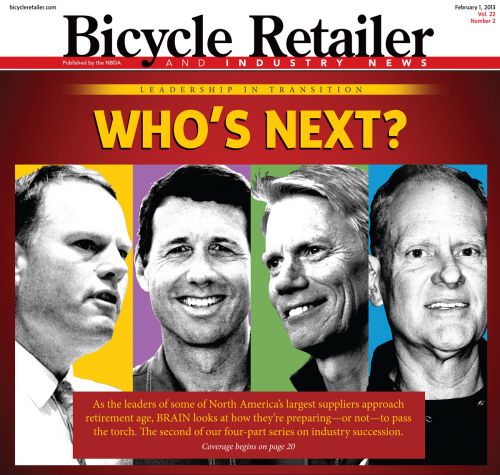Editor's note: The following article ran in the February 1 issue of Bicycle Retailer & Industry News.
MORGAN HILL, CA (BRAIN) — Mike Sinyard has kept his finger on the pulse of his homegrown bike brand, now among the top three in the U.S. market, for nearly four decades. And he has no plans to change that anytime soon.
He no longer takes orders on the phone or ships packages, as in the early days, but Sinyard, 63, works perhaps just as much if not more than when he founded Specialized in 1974. He doesn’t anticipate reducing his hours, either, though he says his focus has shifted to developing people more than product or sales.
“My role continues to evolve and people’s roles here at the company do as well,” Sinyard said. “But if someone asks, ‘Are you ever going to stop working?’ The answer is no. It’s like if somebody asks, ‘Are you ever going to stop riding your bike?’
“What I enjoy is not the personal financial success, because the way our family lives is not much different than any of the other people here,” Sinyard added. “What I’ve discovered is I love working, I love what I do, I love bikes and I love the journey.”
Sinyard said, “When a leader gets tired and loses focus, a business goes down.” But he emphasizes that he’s far from being tired. He still travels extensively overseas and domestically to trade shows and to visit subsidiaries, distributors and retailers. And he makes sure to be reachable—whether out on business or vacation.
Heading up a global, multimillion-dollar company is a 24-hour-a-day job for Sinyard. His employees can expect to receive emails any time of day, as early as 4 a.m. and as late as 10 p.m., depending on where he’s traveling. Specialized is a business he lives, day in and day out. He doesn’t resent the long hours, or even look forward to a time when he can work less. When asked how many years he thinks he could continue at that level, “probably another 25” he says, laughing.
It’s an answer that’s as much joke as truth, at least in his eyes, and a testament to the difficulty of letting go of the company to which he’s been such a central figure.
Born to parents of modest means—his dad was a machinist and his mom worked the family farm—Sinyard was introduced to work early in life, getting up at the break of dawn to help with chores while other neighborhood kids slept in.
“My parents always said, ‘When you stop working and you stop doing things, you’re just dead. You’re made to work. The body is made to move,’ ” Sinyard recalls.
That philosophy about work and life has stayed with him. But he’s quick to point out that for as much as he’s still highly involved in the day-to-day, Specialized is not a one-man show, even if that’s the perception in the industry.
“There are times when things aren’t working when I have to get in deeper and encourage and instruct and kind of reset, but 90 percent of the time those things are just going,” Sinyard said. “And the people are really driving it and they are Specialized.”
In the early days Sinyard says he was caught up in the development of Specialized’s mountain bike line and worked closely with his product designers and engineers, but that is less of what he does on a daily basis now. “With the current suspension technology out there, everything is so evolved, they’re so beyond what I am and what I can even add in value or even questions, and there’s a lot of that throughout the company,” Sinyard said.
So, Sinyard says he spends up to 70 percent of his time coaching and developing staff—and he admits that the culture at Specialized doesn’t suit everyone. Much like the expectations Sinyard puts on himself, he is demanding of time, dedication and an unrelenting passion for bikes from his employees. And he teaches by doing. This approach has led to turnover, but he sees that as necessary change.
“Everybody here is driven and competitive, and you have to fit to thrive in this collaborative culture,” he said. “We know quick when somebody comes in if they are a fit or not; sometimes the company outgrows them.”
Sinyard isn’t interested in selling his majority ownership stake. He doesn’t care for amassing personal wealth or retiring anytime soon. Rather, what drives him and his brand, in his words, are his sense of responsibility to retailers and his love of work, bikes and people—not necessarily in that order.
“Our mission is to set up Specialized to continue forever,” he said. “It’s like being on a racing team. When you can’t add any value and you’re slowing things down, it’s probably good to change the role, be a coach or a manager but not the athlete. I think I have done that.”
He has a son and two daughters who have handled some projects for the company in the past but don’t work there now and are not in line to take over management.
An executive team of senior managers and an advisory board made up of industry outsiders serve as mentors. And while there is no clear single leader set to take his place tomorrow, Sinyard rattles off names of key employees who could carry on the torch collectively should the need for new leadership arise.
He said he’s also developing talent from which a new set of leaders can emerge in five to seven years.
“Today, we’ve worked at having more mobility inside the company,” Sinyard said. “There are many people here who are great and who as a combination could run the company because they are doing it today.”


